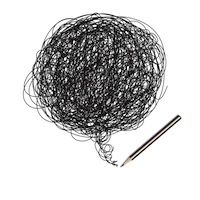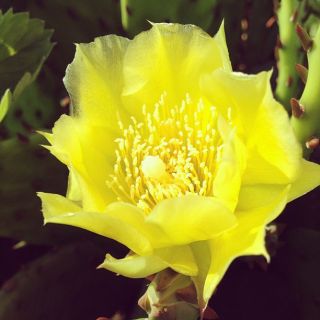Mindfulness
Overcoming Creative Block: Resources for Mindful Creativity
Resources for incorporating mindfulness to overcome stifled creativity
Posted June 20, 2013

Most creatives would probably agree that their inspiration comes from experiencing strong emotion—be it awe in the wonder of the natural world or pain from the complexity of human relationships. But inspiration alone is not enough to create. Creatives must translate the inspiration into their ‘product’ by frequently practicing their craft, maintaining discipline, and working through mental blocks.
As a stuck creative, it is heartening when we discover that even the most successful artists and writers experience these blocks. Stories abound of best-selling authors experiencing durations of painful writer’s block and depression. So what do they do to “snap out of it”? How do they generate ideas and motivation when they hit a wall?
Research on the science of mindfulness suggests it could hold answers for struggling creatives. I’ve personally found that, regardless of the science, learning how to cultivate mindfulness during my own bouts of creative block has been a welcome discovery. And even though my curiosity usually has me pulling back the curtains on the inner workings of the human experience, when it comes to mindfulness and creativity, I love the mystery and trust the process. Sometimes I just don’t have to know why.
Everyone experiences mindfulness differently. An artist might think of mindfulness like buying a brand new canvas or sketchbook. It can create a refreshing starting point for new ideas and energy to enter our all-too-cluttered minds. Some will say that mindfulness is those “in flow” moments of being absorbed in their work, while others prefer to step away to practice in a quiet space.
It can seem counterintuitive to stop and step away from the work desk in order to find more energy, motivation, and inspiration. But mindfulness breaks can do just that-- granted it takes a certain amount of trust in the process. For those unfamiliar with mindfulness, they’ll soon realize that we don't have to be “doing nothing” nor “trying hard” to be mindful. We can let go of any preconceived notions about what mindfulness should be, and create our own individual meaning and method.
I’ll be the first to admit that I have yet to develop a disciplined meditation or mindfulness practice. I try something structured, and the structure gradually falls away. Yet I keep coming back to the casual everyday mindfulness side of the awareness spectrum, something I’ve written about in a short introduction on the topic. People may disagree on how mindfulness should be defined and explained -- some consider mindfulness a practice, some consider it a lifestyle, others consider it a spiritual orientation -- but regardless of labels, it holds many possibilities.
If you’re in the midst of a creative block, perhaps you can start to overcome the block by stopping what you’ve been “trying”. Just for today, consider a pause in the trying-so-hard of figuring out what to produce next. Just for today, if you’re feeling frustrated about your progress, pause the rules you’ve created for yourself.
Author and Harvard professor Ellen Langer wrote in her blog, "The life well lived is best lived effortlessly. I know I may be going out on a limb with this, but it is where my thoughts effortlessly lead me. Trying, in many instances, is based on mindless evaluation....No matter how hard I try not to overeat, not to be stressed, not to be angry, I am likely to overeat, be stressed and angry at some point soon, if not immediately. Sometimes I overeat because no one, not even me should push me around."
Take some time today to stop pushing and give yourself permission to be still and open to whatever is around you. Notice the sounds of the room and the colors of the walls- how the shadows play with the light. Notice the pace of your breathing and where you’re holding stress in your body. Relax your shoulders and breathe into the tension. Go for a walk and simply engage your senses with what’s around you. That is mindfulness. See what happens.

Know that most creatives have been through these frustrating and anxious moments of creative block and overwhelm. I think many of them would say it means you’re on the verge of your next creative breakthrough. In the meantime, maintain a little corner of self-compassion as you sit with the struggle, trusting that you will soon have something to share and the world deserves to see it.
Resources for Understanding the Creative Process and Mindful Creativity:
Blog: Maria Popova curates Brain Pickings, the most wonderful blogs about the creative process of famous writers and artists.
Journal Article: Mindfulness and the Art of Living Creatively: Cultivating a Creative Life by Minding Our Mind by Satinder Dhiman.
Book: On Becoming An Artist: Reinventing Yourself Through Mindful Creativity by Ellen Langer
Book: The Mindful Writer: Noble Truths of the Writing Life by Dinty W Moore
Book: Zig Zag: The Surprising Path to Greater Creativity by Keith Sawyer
Book: The Artist's Way by Julia Cameron
Ebook: Cultivating Your Everyday Mindfulness by Brad Waters
Psychology Today blog: Creative Writing and Your Brain by Jenni Ogden, Ph.D.
Psychology Today blog: The Art of Creativity by D. Goleman and P. Kaufman
Psychology Today blog: Be Here Now: Mindfulness and the Creative Spirit by Cathy Malchiodi Ph.D.
Do you know other resources on mindfulness & creativity or overcoming creative blocks? Do you have a routine/practice that keeps your creative spirit alive? Please feel welcome to share in the comment section below. Your input might just help someone who's stuck in creativity block.




